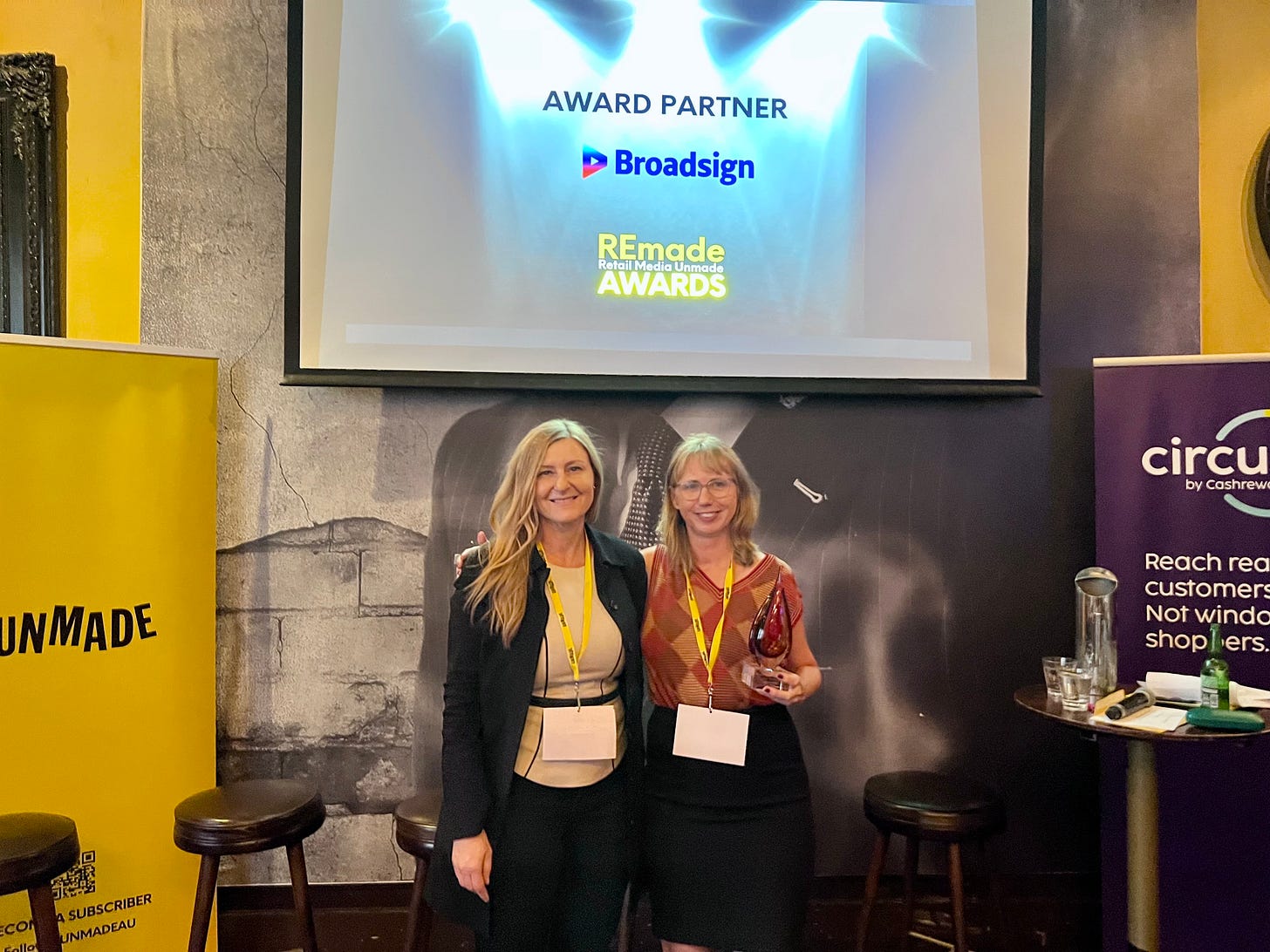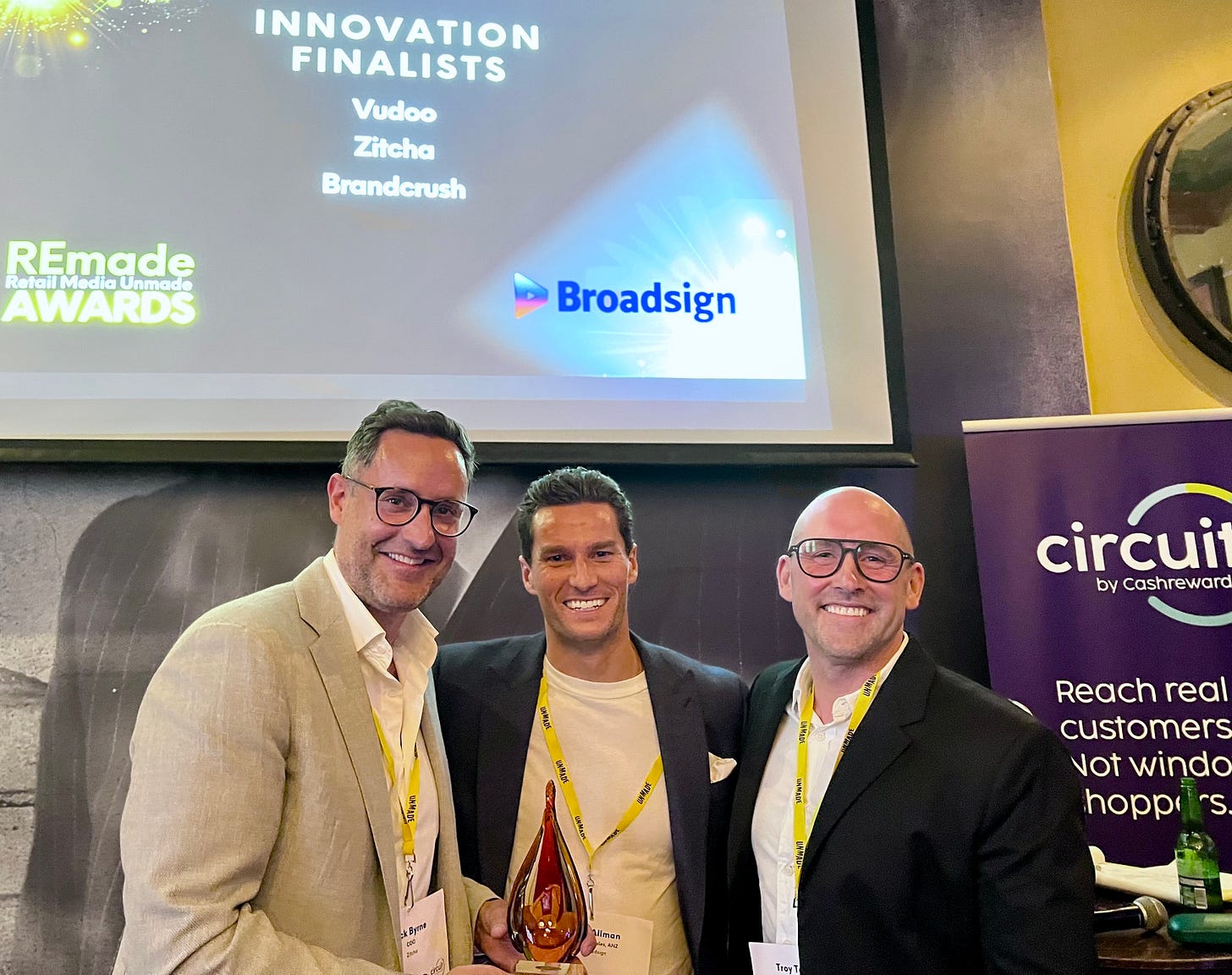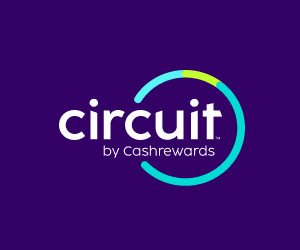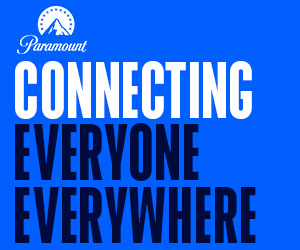REmade winners; The Amazon conundrum; keeping pace with The Warehouse Group
Welcome to a retail media-focused edition of Unmade as we celebrate the winners of the inaugural REmade Retail Media Awards.
This month’s Q&A guest is Alex Lawson, Head of Strategy and Media for The Warehouse Group in New Zealand who reveals how he’s trying to stay two years ahead.
And this month’s column from retail media evangelist and global consultant Colin Lewis explains how Amazon’s lack of branded search is helping level the playing field for SMEs up against the big brands.
Further down we also bring news of Seven hitting a landmark low on the ASX.
Only Unmade’s paying members get full access to all of our content and archives. For members in Melbourne, that includes a complimentary ticket to next week’s Compass event. Upgrade today.
Winning ways at the REmade Retail Media Awards
Seja Al Zaidi writes:
The recipients of our very first REmade Awards recognising the best in retail media were announced on Tuesday evening, as part of Unmade’s Compass event in Sydney.
The winners for the retail media categories of Innovation, Collaboration and Leadership were:
The REmade Award for Innovation:
Of the shortlisted applicants - Vudoo, Zitcha and Brandcrush - Zitcha was the recipient of the retail media innovation award for what judges said was a ‘solid approach to providing a platform for online & offline retail media inventory as well as off-platform activity. The approach helps streamline campaigns, reporting and measurement’.
The REmade Award for Collaboration:
The projects that were shortlisted for the collaboration award were Great Australian Made Bites, Fat Bastard and A Vision of Premium Shopper Engagement.
Fat Bastard, which saw Joval Wines, Zitcha, Hatched and Coles Liquor Group come together, took home the collaboration award for its ‘well executed omnichannel strategy’, and ‘showcasing the power of what retailer media can achieve including precision targeting, tested creative, and real-time data to deliver success, even with a smaller budget’.
The REmade Award for Leadership:

The shortlist was comprised of Troy Townsend, CEO and co-founder of Zitcha, Teresa Aprile, co-founder and CEO of Brandcrush, Nancy Veart, GM at Cartology and Roger Dunn, SVP business development at CitrusAd.
The jury chose Nancy Veart, saying that her achievements driving the Cartology business to considerable growth were particularly commendable. "The passion demonstrated for the industry, and consideration for the true impact to their business partners as trusted advisors” was noted as “the kind of leadership the jury were pleased to have the opportunity to reward.”
Bravo to our winners, and thank you to everyone who entered.
REmade - Retail Media Unmade returns in 2024.
Unmade’s retail media conference REmade will be back in 2024 - please send your subject and speaker ideas to curator Cat McGinn.
Q&A: The breakneck boom in digital in-store
In each REmade newsletter we feature a Q&A with a key player in the retail media space. Our guest today is Alex Lawson, Head of Strategy and Media, The Warehouse Group, New Zealand.
What has changed this year?
So much! The last 12 months feel like they’ve gone at breakneck speed with new offerings and innovation coming at every turn. One that’s close to home for me is the boom in digital in-store media. The in-store environment has never been more dynamic and interesting and the mix of old-school physical point of sale (POS) and new school screens is fascinating right now.
The acceleration of automation has been incredibly evident in the last year to 18 months. When we started our automation journey we were the first in NZ to do so and maybe in ANZ. That platform, Zitcha, has become world-leading and something we’re very proud to have been a part of.
Watching now the advancements that many in the US, UK , EMEA and ANZ have made in this space is at once inspiring and challenging. After a recent trip to Chicago for the Path to Purchase Institute summit, we figured we were about two years ahead of the global market in automation and set ourselves a challenge to stay two years ahead. Currently, I think that lead has been eaten into so we have some good challenges ahead of us to regain our lead!
What do you see as being the next focus area for the industry?
I think there are two massive challenges facing us in ANZ, and really the world. The first is getting to an industry standard for measurement and reporting. There has been some good work to date out of the US and UK and the recent IAB Australia glossary shows that there is intent to move in this part of the world, but we’re a long way from success. Our clients need, and deserve, accuracy and consistency in what they can expect from retail media networks.
The second area is the application of first person data (1PD) application in ways that drive efficiency and value. We’re the owners of an insane amount of 1PD. Not only is that a great responsibility to use it correctly and judiciously, but it’s a responsibility to find ways to use it that deliver results for our clients. I don’t think there’s anyone currently utilising this power to its full effect.
Currently, we’re looking to companies like Amazon with AMC and Walmart with Luminate as the leaders in this field and working to create a NZ solution.
What recent work accomplishment are you most proud of? And what are you most excited about in terms of future plans, innovation at work etc.?
Getting MarketMedia (The Warehouse Group’s retail media platform) to the stage we’re at now is the thing that makes me happiest right now. It’s been a tough two years but we’ve gone from standing up a rudimentary offering based on off-platform package buys with two of us doing literally everything from invoice queries and proof of executions to vision, strategy and pitching to the board, to now a growing team of seven, a world-leading automation platform, a best in class screen rollout and a business and technology development roadmap that is so full it’s actually scary. I can’t think of anything I’d rather be doing right now.
What are your expectations for the challenges and opportunities that lie ahead in 2024?
As much as I’d like to don the rose-tinted specs here and imagine a 2024 full of unicorns, rainbows and lollipops, I think it’s going to be a tough year. This cost of living crisis seems to be hanging around stubbornly and we’re going to be coming out of it for a while.
This means that we need to continue to innovate in this space (and across retail as a whole) to keep moving forward.
For those in the retail media game, I see this being in the continued advancement of automation and our understanding and deployment of first party data solutions to drive scale and effectiveness.
How are you feeling about the speed of the AI transformation, and how do you see AI impacting retail media?
I’m here for it! AI can be a super scary prospect and we all have visions of Skynet and Terminators but the reality I think is much less scary and can be much more helpful.
One challenge that many retail media networks face is a long tail of smaller clients that are impossible to actively manage on a day-to-day basis, many of whom don’t actually want us to. But currently, there is a gap between us providing automation solutions and the end users’ media planning skills.
I see AI as a way for us to create solutions for this, intelligent co-pilots that can help advise, suggest and activate for clients delivering them better solutions via our channels. With no one yet providing that solution globally it’s going to be exciting to try and deliver it.
What recent book, TV show, film or idea changed the way you saw the world, in a large or small way?
Can I have two here? Ok, it’s really three, but I’ll bundle two into one to save space. I don’t think I can go past Succession, and by direct association the excellent The Murdochs: Empire of Influence that I binged on the flights to and from REmade! Murdoch and his brood (and therefore Logan Roy and his not greatly exaggerated family) have always been part of my upbringing, being born and raised in the UK. His name was never far from our TV screens and popular culture and his papers were ubiquitous but I don’t think I ever really grasped the real political power that he holds in both the UK and US and how he’s actually changed the world to what he wants. It’s crazy really and possibly the closest we’ve had to an Emperor since the Romans. It really made me realise how the few control the many in so many areas of our world.
But the above is a pretty worthy and earnest answer so I’d really have to say that a recent recommendation from a colleague to watch Don Cheadle’s House of Lies, a cynical look at the consultancy industry has really been the biggest influence of late. Watching the adventures of McKinsey parodies Marty Kaan and his crew reminds me that there’s a lot of bullshit in our industry and a lot of believing of our own bullshit to go with it.
House of Lies reminds me of that, and I’m trying not to believe too much of my own as a result.
We welcome suggestions for future Q&A guests to cat@unmade.media
Amazon’s brand name conundrum
Small brands can still succeed on Amazon, writes marketer and global retail media specialist Colin Lewis in his regular column for REmade.
The democratising force of Amazon Marketplace… for now
When shoppers come to Amazon, most already have clear intent: they are looking for a particular product or solution.
Shoppers are rarely, however, looking for a specific brand - only one in five Amazon searches include a branded term.
For Australian brands new to Amazon, it is important to know one thing: a shopper’s first step is to use the Amazon search bar. Different people will phrase their search in very different ways, though, even if they’re looking for the same thing.
Given that Amazon browsers and shoppers are not brand-focused and 60% of Amazon’s revenue comes from its marketplace, you can understand why there are hundreds and thousands of small businesses that rely on the platform much more than big brands.
Only a few mega-brands like Coca-Cola, Dyson, and Apple manage to eclipse Amazon's brand name on the platform. These brands have built such strong recognition that customers search for them directly.
The lack of branded search means SMEs can win against the big brands. Indeed, you can argue that the Amazon Marketplace is a democratising force in this context.
However, Amazon's primary interest is to maximise its own revenue and customer experience.
While SMEs are crucial to its business, Amazon may not always prioritise their visibility. This appears to be coming true, according to research from Kiri Masters, head of retail strategy at Acadia.
Amazon appears to be testing features that reduce the visibility of small brands, especially during key moments like searches. This can make it challenging for SMEs, especially newer ones, to stand out and gain traction on the platform.
Let’s look at some examples from Masters: here Amazon is removing brand names from search results:
Amazon has removed brand names from product titles as they appear in search results. Of course, brands normally name their products with the brand name so that shoppers who do know the brand can spot it in the search results. But in search, these same products are popping up with all the information, but without the name showing. This seems to be Amazon’s move to drop a brand name out of consideration for customers when shopping for a generic product or category – if customers search for a brand by name, the name will appear in the results. You can see how this gives bigger brands the upper hand.
Why is this? According to Masters, by reducing the visibility of smaller brands, Amazon may be trying to maintain a consistent shopping experience and emphasise its own brand and services.
Or perhaps Amazon is fixing search results to reinforce its own brand dominance, even when shoppers are not looking for Amazon-branded items.
Another reason could be much simpler: Amazon values volume. Small brands drive volume, but not one or a few small brands – all of them together. Unless Amazon data sees a pattern in brand search volume – meaning people are searching for a specific brand – then they’re not incentivised to put the brand name front and centre when customers are searching.
Amazon’s millions of sellers and products can easily amount to information overload for customers who are already navigating reviews, descriptions, Best Seller tags and more when they select a product. The brand name is less important than the product specs, Amazon has determined.
What can brands do? It won’t come as a surprise, but the way out is to do more Amazon Advertising: sponsored product and sponsored brand ads tap into customer searches to appear in search results. Sponsored brand video ads can also bring attention to the brand.
Indeed, you might argue that Amazon is hiding the brand names just to drive advertising revenue. But that could be just conjecture…
Seven’s slump continues
Seven West Media saw another 3.7% sliced off its market capitalisation on Thursday, slumping to $396m, the first time it has closed below a $400m valuation since 2020.
Meanwhile, B2B mining specialist Aspermont also took a tumble on Thursday, losing 20% of its market cap, which has now fallen to below $20m. In September, the company announced the sudden death of its chairman Andrew Kent through a heart attack.
Audio rivals Southern Cross Austereo and ARN Media both declined too, falling 3.83% and 1.05% respectively. It was the first day of trading since the board of SCA said it would not be pursuing a conversation with ACM proprietor Antony Catalano about acquiring his regional news mastheads, saying it would have been a diversion from its “all about audio” strategy.
Of the larger stocks, only Ooh Media had a good day, rising by 3.23%.
The index finished almost flat on 610.3 points.
Time to leave you to your Friday.
We’ll be back in the morning with Best of the Week.
Have a great day.
Leave us a message at letters@unmade.media













